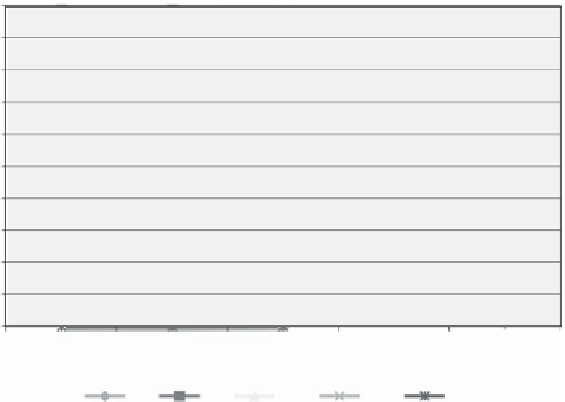Geoscience Reference
In-Depth Information
1
0.9
0.8
0.7
0.6
0.5
0.4
0.3
0.2
0.1
0
0.22
0.24
Inequality (Gini Coefficient)
0.28
0.33
0.36
51
60
112
123
143
FIGURE 4.8. Attitudes Toward Welfare Centralization Among European Social Demo-
cratic Parties and Labor Unions
integration tend to increase, however, when one considers the geography of
economic specialization as well. Brinegar and Jolly (
2005
) provide solid evi-
dence that national politico-economic factors mediate the views of high income
citizens on the process of integration. Specifically, their results indicate that
“support for European integration decreases much faster among respondents
in social democratic welfare states than in residual welfare states as educa-
tion increases” (p. 174). The reason, arguably, lies in the fact that “high-skilled
workers in social democratic states have more to fear than high-skilled workers
elsewhere because their relatively more generous welfare states permit invest-
ment in specific skills and high economic openness” (p. 175). To summarize,
the geographies of income and economic specialization condition the prefer-
ences of both low and high-income citizens in ways consistent with the model's
predictions.
Interestingly, the dividing impact associated with economic geography also
operates at the level of social and political organizations.
Figure 4.8
reports
the findings of an additional set of statistical analyses of a dataset of about
forty European left-wing political parties and labor unions.
17
The dependent
variable reads as follows: “Is a single European social model to be aimed
17
The data come from a study by the Friedrich Ebert Foundation on the “European Social and
Economic Model.” See Busemeyer, et al. (
2006
). The survey was conducted during 2004/2005
on leading personalities from trade unions, ministries, political parties, and employer organi-
zations, in the following European countries: Austria, the Czech Republic, Denmark, Finland,
France, Germany, Great Britain, Greece, Hungary, Ireland, Italy, the Netherlands, Poland, Por-
tugal, and the Slovak Republic. I thank the authors of this study for giving me access to the
survey of political and social organizations on which this study is based.




















